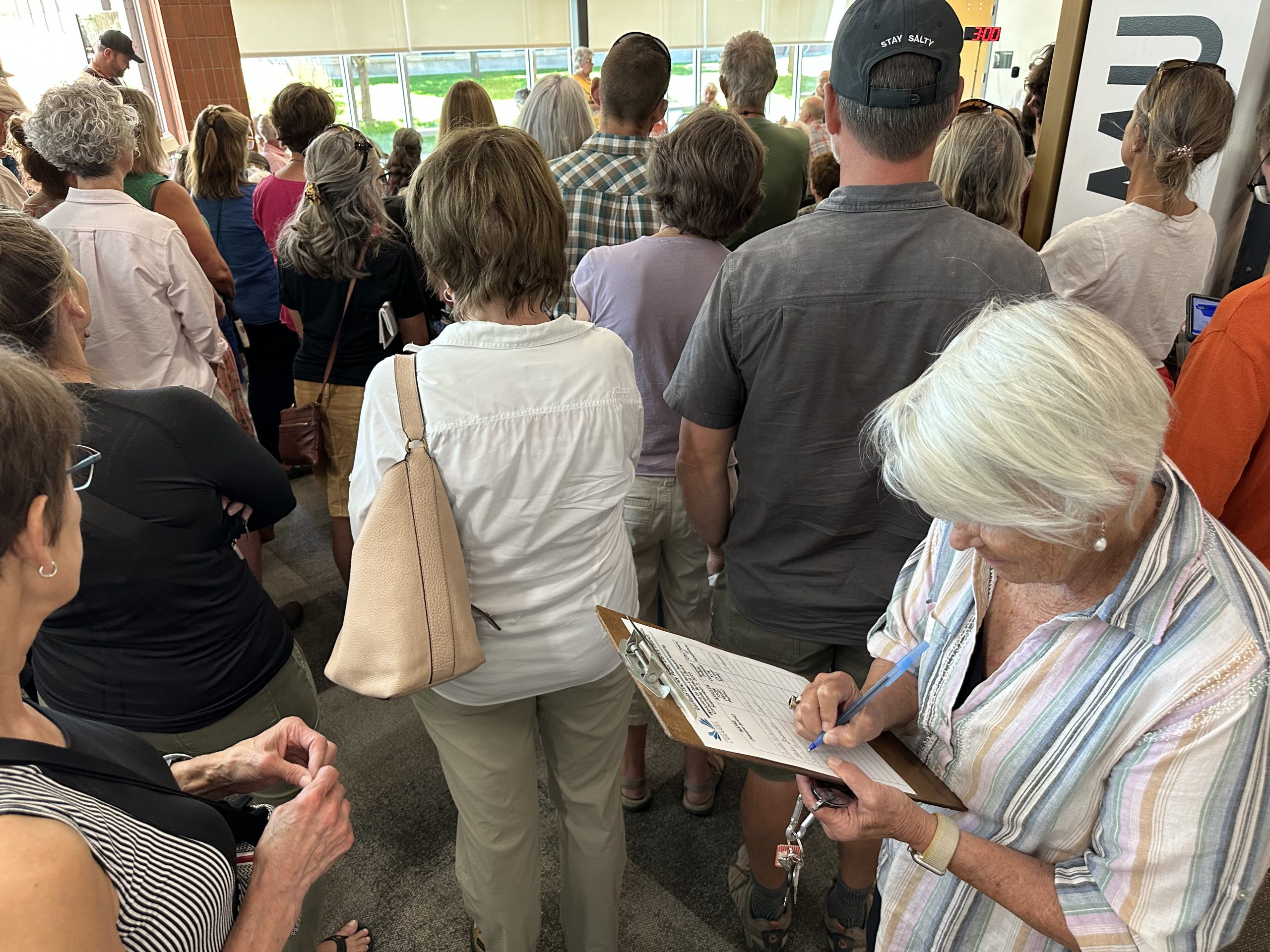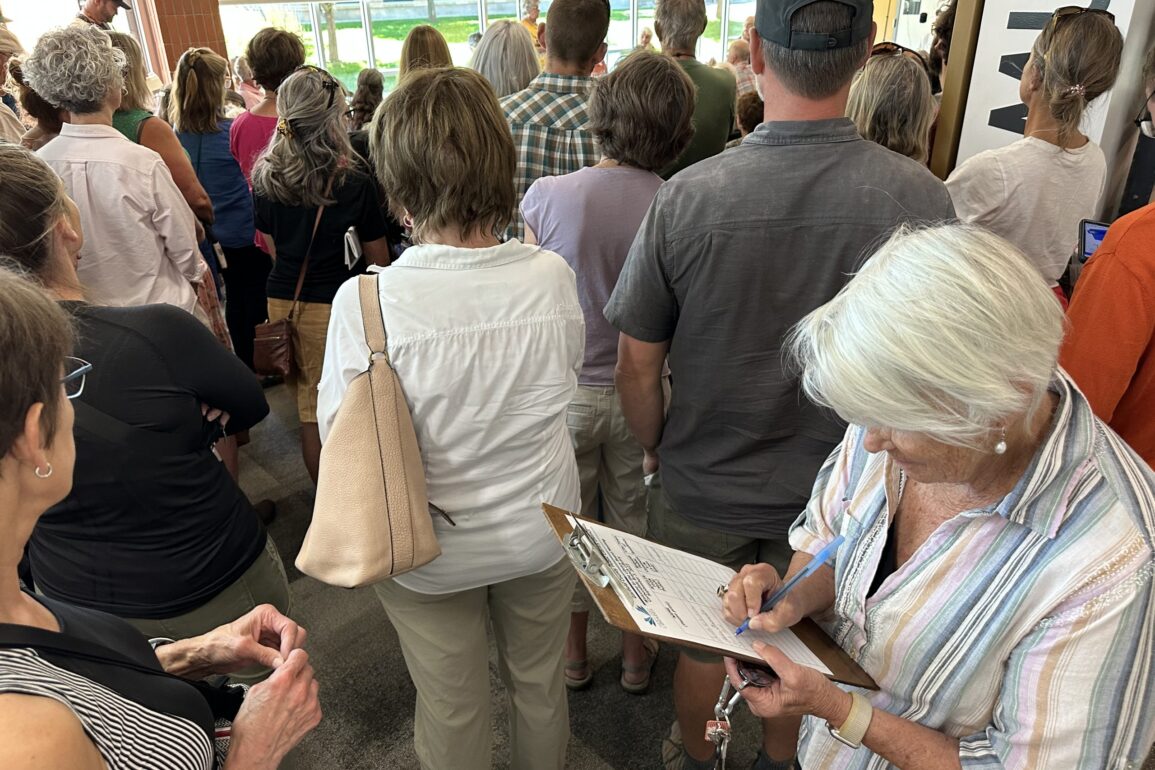The crowd that gathered at the Carbondale Library on Thursday, Sept. 7 was too big for the Calaway Room, and spilled out into the hall. Word was out that Rifle resident Trish O’Grady would be presenting her complaints to the Garfield County Public Library District board of trustees (GLB) about what she considers to be a pornographic book series at the Silt Library called “Prison School” by Akiro Hiramoto.
O’Grady, a former U.S. Air Force mechanic and retired teacher, did not disappoint. Armed with a petition of 844 signatures and poster boards covered with photos of illustrations from the pages of “Prison School,” she appeared to be on a mission.
O’Grady opened with the petition. “We … agree that … ”Prison School #1” and “Finder Series #1”, along with other materials that have a parent advisory warning, should not be freely accessed by minors under the age of 18.”
This isn’t the first time O’Grady has appeared before the GLB. The library district’s executive director, Jamie LaRue, told The Sopris Sun that she spoke at the July GLB meeting in Glenwood Springs and the August meeting in Parachute. O’Grady has also written to local papers, including The Sopris Sun (Aug. 17), about her thoughts on the books.
The challenge includes locking the materials in a bookcase, employee area or a separate room marked as “adult only” to be checked out by adults 18 or older with proof of age. The petition goes on to say, “If these requirements are not met, then we request all materials of the aforementioned warning be removed from the library inventory.”
LaRue told The Sopris Sun that O’Grady’s challenge is definitely a First Amendment issue. “My feeling about this one, is that the libraries don’t exist to restrict access,” he explained. “We exist to expand access.”

People sign in to attend the meeting, which flowed out of the room. Photo by Lynn “Jake” Burton
LaRue is no stranger to library challenges. “A challenge means a request to remove or restrict access to some library resource,” he explained. “Just about anything a library does has been challenged.” He said he’s dealt with more than 1200 challenges throughout his career as director of Douglas County Libraries and as director of the Office for Intellectual Freedom at the American Library Association (ALA) in Chicago.
He added that most of the ALA challenges addressed about 3% of what’s published today. “[Works by] LGBTQ [individuals], people of color and other traditionally marginalized populations,” he said. “Three percent of all library materials falls into these categories and 99% of the challenges focus on this 3%,” he said.
LaRue added that the current “Prison School” challenge in Garfield County is part of a larger national movement. “I’ve seen it morph from just individual parental panic, like, ‘Oh my gosh my child is growing up too fast and I want to slow him down,’” he continued, “to anti-critical race theory laws, don’t say gay laws and criminalizing books, and the teachers and librarians who provide access to those books.”
O’Grady describes herself as a conservative Christian. “I believe in my God, my country, and our children,” she told The Sopris Sun at Thursday’s meeting. “I’m here on the part of the children, mostly because a lot of parents are failing [them].” She agrees that this is a First Amendment issue. “But, the First Amendment does not cover child pornography and obscenity,” she said. “Then, you have to delve into what is the definition of child pornography and obscenity, and people have different opinions about that.”
According to the U.S. Justice Department (DOJ) Citizen’s Guide to U.S. Federal Law on Child Pornography, “Images of child pornography [any visual depiction of sexually explicit conduct involving a minor] are not protected under First Amendment rights, and are illegal contraband under federal law.” The 2003 PROTECT Act prohibits the creation, distribution, and possession of child pornography that includes: a) a minor, b) a digital or computer image that is “indistinguishable” from that of a real minor, or c) an image which has been created or modified to appear to be that of an “identifiable minor” engaging in sexually explicit conduct.”
The Act excludes “drawings, cartoons, sculptures, or paintings depicting minors or adults.” Unless they are considered obscene, which is where things get complicated.
Obscenity is determined by using something called the Miller Test, established by the Supreme Court and based on legal cases from the ‘70s and ‘80s. The test asks jurists and judges to determine if something is obscene by holding it up to three standards, including: appeal to prurient interests, depicting sexual conduct in a patently offensive manner and if the matter in question lacks serious literary, artistic, political or scientific value.
“The manga that’s being challenged has been around for a long, long time. It’s mostly a Japanese kind of art form,” said LaRue. He added that it has sexual content but it’s not just about sex. “I think very often what happens when materials are challenged, it’s an attempt to both diminish the context of the original work and to diminish the mind of the child who might encounter it.”
For O’Grady, it’s less nuanced. “I think this is very obvious,” she said. “I don’t know how you can misconstrue illegal sexual activity towards children and that’s what I see in these drawings.”
LaRue responded to O’Grady’s challenge by letter in August, explaining the GLB’s determination process and stating that the books in question will remain in the library “as currently cataloged and shelved.” O’Grady hopes for a future compromise, but she’s not sure what she’ll do next.
This post was originally published on this site be sure to check out more of their content.







